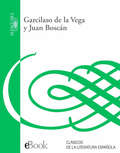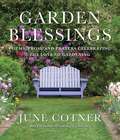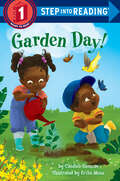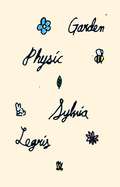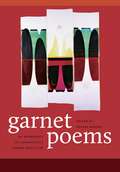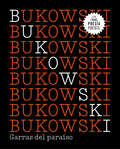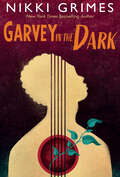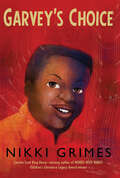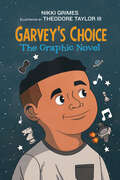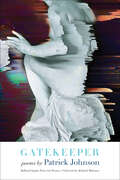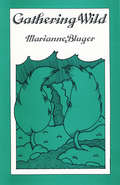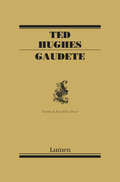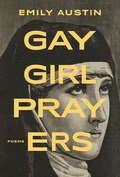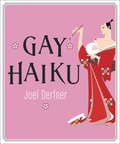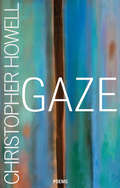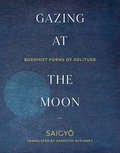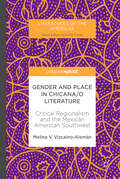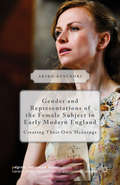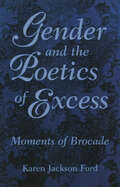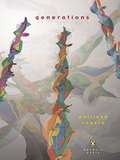- Table View
- List View
Garcilaso de la Vega y Juan Boscán
by Garcilaso De la Vega Juan BoscánJuan Boscán introdujo las formas y los temas de la lírica que habían triunfado en Italia, lo que señala el final de nuestra poesía medieval y el inicio de la renacentista. Garcilaso continúa ese camino con genialidad, por lo que ha sido admirado por los poetas de todos los tiempos. Su poesía es culta y refinada, pero al tiempo sencilla y musical: #Coged de vuestra alegre primavera / el dulce fruto, antes que el tiempo airado / cubra de nieve la hermosa cumbre#.
Garden Blessings
by June CotnerGarden Blessings is an eloquent tribute to the wonders of the garden, a place where our souls are nourished and memories grown. June Cotner is a legend in the world of gift books with her inspirational books that have sold nearly one million copies. Her books comprise a balance of about 20 percent classic and famous writers and 80 percent lesser-known, award-winning writers, which results in discovering many selections not found anywhere else. Ranging from childhood memories of planting and harvesting to celebrations of the changing seasons to contemplation on the joyful art of gardening, Garden Blessings is a moving collection of poems, prayers, and reflections that remind us of what really matters-making and sharing memories.Our gardens grow us and this collection of readings takes us down a path of pleasure. The overriding intention of Garden Blessings is to provide a heartwarming, spiritually-focused collection of uplifting prayers, prose, and poems that share a common joy and appreciation for the love of gardening and the many blessings that gardens bring to our lives. June Cotner, a #1 inspirational author, has gathered a bounty of garden blessings here, offering gems of wisdom that remind the reader and gardener in all of us just how much we learn from our gardens.
Garden Blessings: Prose, Poems and Prayers Celebrating the Love of Gardening
by June CotnerGarden Blessings is an eloquent tribute to the wonders of the garden, a place where our souls are nourished and memories grown. June Cotner is a legend in the world of gift books with her inspirational books that have sold nearly one million copies. Her books comprise a balance of about 20 percent classic and famous writers and 80 percent lesser-known, award-winning writers, which results in discovering many selections not found anywhere else. Ranging from childhood memories of planting and harvesting to celebrations of the changing seasons to contemplation on the joyful art of gardening, Garden Blessings is a moving collection of poems, prayers, and reflections that remind us of what really matters--making and sharing memories. Our gardens grow us and this collection of readings takes us down a path of pleasure. The overriding intention of Garden Blessings is to provide a heartwarming, spiritually-focused collection of uplifting prayers, prose, and poems that share a common joy and appreciation for the love of gardening and the many blessings that gardens bring to our lives. June Cotner, a #1 inspirational author, has gathered a bounty of garden blessings here, offering gems of wisdom that remind the reader and gardener in all of us just how much we learn from our gardens.
Garden Day! (Step into Reading)
by Candice RansomA welcome-to-spring Step 1 reader featuring the family from Pumpkin Day!, Apple Picking Day!, and Snow Day!It's springtime, and the perfect day to plant a garden! The brother and sister from Pumpkin Day!, Apple Picking Day!, and Snow Day! return and plant peas in their backyard. Read along as they dig holes, water the plants, and build a scarecrow with their parents! Easy-to-follow rhyme ensures a successful reading experience, and bright, fun art enhances the story.Step 1 Readers feature big type and easy words. Rhymes and rhythmic text paired with picture clues help children decode the story. For children who know the alphabet and are eager to begin reading.
Garden Physic
by Sylvia LegrisA musical celebration of the garden, from chaff to grass, and all of its lowly weeds, herbs, and creatures Sylvia Legris’s Garden Physic is a paean to the pleasures and delights of one of the world’s most cherished pastimes: Gardening! “At the center of the garden the heart,” she writes, “Red as any rose. Pulsing / balloon vine. Love in a puff.” As if composed out of a botanical glossolalia of her own invention, Legris’s poems map the garden as body and the body as garden—her words at home in the phytological and anatomical—like birds in a nest. From an imagined love-letter exchange on plants between garden designer Vita Sackville-West and Harold Nicolson to a painting by Agnes Martin to the medicinal discourse of the first-century Greek pharmacologist Pedanius Dioscorides, Garden Physic engages with the anaphrodisiacs of language with a compressed vitality reminiscent of Louis Zukofsky’s “80 Flowers.” In muskeg and yard, her study of nature bursts forth with rainworm, whorl of horsetail, and fern radiation—spring beauty in the lines, a healing potion in verse.
Garnet Poems: An Anthology of Connecticut Poetry Since 1776 (The Driftless Connecticut Series)
by Dick Allen Dennis BaroneConnecticut may be a small state, but it is large indeed in its contribution to the nation's literature. Garnet Poems features forty-two poets whose work has a strong connection to Connecticut. The first major anthology of Connecticut poetry to appear since the mid-nineteenth century, it includes the work of such notable poets as Wallace Stevens, Lydia Sigourney, Mark Van Doren, Richard Wilbur, Susan Howe, and Elizabeth Alexander. Distinguished writer-scholar Dennis Barone has supplemented the poems with an editor's preface, notes that illuminate the poet's (or poem's) relation to the state, and informative biographies. The book also features a foreword by Dick Allen, the current Connecticut state poet laureate.
Garras del paraíso
by Charles BukowskiGarras del paraíso, de la colección «Poesía portátil», es el reflejo poético de una existencia vivida al límite. <P><P>Charles Bukowski hunde su lírica en las drogas, el sexo y el realismo sucio de las clases más oprimidas, una desolación que siempre buscó la belleza. <P>Escritor de culto en toda Europa, Charles Bukowski usó la poesía para describir la depravación de la vida urbana y retratar a las clases más oprimidas de la sociedad norteamericana. <P>Autor prolífico e icono del realismo sucio, combinó emoción e imaginación con un lenguaje directo y repleto de imágenes violentas y sexuales. Transgresores, sus poemas son el reflejo de su personalidad intensa, resultado de una existencia vivida al límite. <P>Nacido el 1920 en Andernach (Alemania), hijo de un soldado norteamericano y una costurera alemana, Bukowski se trasladó a Los Ángeles junto a su familia siendo todavía un niño. <P>Narrador y poeta, sus textos son casi siempre autobiográficos -protagonizados por él mismo o por su alter ego, Henry Chinasky- y se ocupan del lado más salvaje de la vida con un lenguaje agresivo y descarnado. <P>Bukowski publicó más de cuarenta libros entre recopilaciones de relatos, poemarios y novelas, y falleció en San Pedro, California, en 1994. -------«lo más importante essaberatravesar elfuego.»-------
Garras del paraíso (Flash Poesía #Volumen)
by Charles BukowskiGarras del paraíso, de la colección «Poesía portátil», es el reflejo poético de una existencia vivida al límite. Charles Bukowski hunde su lírica en las drogas, el sexo y el realismo sucio de las clases más oprimidas, una desolación que siempre buscó la belleza. Escritor de culto en toda Europa, Charles Bukowski usó la poesía para describir la depravación de la vida urbana y retratar a las clases más oprimidas de la sociedad norteamericana.Autor prolífico e icono del realismo sucio, combinó emoción e imaginación con un lenguaje directo y repleto de imágenes violentas y sexuales. Transgresores, sus poemas son el reflejo de su personalidad intensa, resultado de una existencia vivida al límite. Nacido el 1920 en Andernach (Alemania), hijo de un soldado norteamericano y una costurera alemana, Bukowski se trasladó a Los Ángeles junto a su familia siendo todavíaun niño. Narrador y poeta, sus textos son casi siempre autobiográficos -protagonizados por él mismo o por su alter ego, Henry Chinasky- y se ocupan del lado más salvaje de la vida con un lenguaje agresivo y descarnado. Bukowski publicó más de cuarenta libros entre recopilaciones de relatos, poemarios y novelas, y falleció en San Pedro, California, en 1994. -------«lo más importante essaberatravesar elfuego.»-------
Garvey in the Dark
by Nikki Grimes"Garvey in the Dark is more than a beautifully crafted novel in verse. It&’s a story that faces news headlines and captures the wild emotional roller coaster of the COVID-19 pandemic with honesty and courage. A must-read for young people who lived through the early days of the outbreak as well as those who will be curious about it in years to come." —Kate Messner, New York Times bestselling author&“With deceptive simplicity, Grimes captures characters and emotions by wielding a poetic form—the tanka—with superb and superhuman strength, and the result is a beautiful and brilliant book about how faith, grace, and familial love can help us triumph over adversity...&” —Padma Venkatraman, Walter Award-winning author of The Bridge HomeCapturing the shock and impact of the COVID-19 pandemic through the eyes of Garvey, a beloved character, Nikki Grimes&’s newest novel in verse shows readers how to find hope in difficult times.Garvey&’s finally happy—he&’s feeling close to his father through their shared love of music, bullies are no longer tormenting him, and his best friends Manny and Joe are by his side. But when the schools, stores, and restaurants close because people are getting sick, Garvey&’s improved life goes into lockdown as well. And when Garvey&’s father gets sick, Garvey must find a way to use his newfound musical skills to bring hope to both his father and himself. Moving, powerful, and beautifully told, this remarkable novel shows readers how even small acts have large reverberations, how every person can make a difference in this world, and how—even in the most difficult times—there are ways to reach for hope and healing. Nikki Grimes is a New York Times bestselling author who has won the ALAN Award for outstanding contributions to young adult literature, the Children's Literature Legacy Award, the Virginia Hamilton Award for Lifetime Achievement, and NCTE Award for Excellence in Poetry for Children. She has also received several ALSC Notables, a Coretta Scott King Author Award, Coretta Scott King Author Honors, Boston Globe-Horn Book Honors, a Printz Honor, and a Sibert Honor.
Garvey's Choice
by Nikki GrimesGarvey's father has always wanted Garvey to be athletic, but Garvey is interested in astronomy, science fiction, reading--anything but sports. <P><P>Feeling like a failure, he comforts himself with food. Garvey is kind, funny, smart, a loyal friend, and he is also obese, teased by bullies, and lonely. <P><P>When his only friend encourages him to join the school chorus, Garvey's life changes. The chorus finds a new soloist in Garvey, and through chorus, Garvey finds a way to accept himself, and a way to finally reach his distant father--by speaking the language of music instead of the language of sports. <P>This emotionally resonant novel in verse by award-winning author Nikki Grimes celebrates choosing to be true to yourself.
Garvey's Choice: The Graphic Novel
by Nikki GrimesThis emotionally resonant novel in verse by award-winning author Nikki Grimes celebrates choosing to be true to yourself.Garvey's father has always wanted Garvey to be athletic, but Garvey is interested in astronomy, science fiction, reading—anything but sports. Feeling like a failure, he comforts himself with food. Garvey is kind, funny, smart, a loyal friend, and he is also overweight, teased by bullies, and lonely. When his only friend encourages him to join the school chorus, Garvey's life changes. The chorus finds a new soloist in Garvey, and through chorus, Garvey finds a way to accept himself, and a way to finally reach his distant father—by speaking the language of music instead of the language of sports.
Gatekeeper: Poems
by Patrick JohnsonA prize-winning poetry collection that delves into the dark wood of the digital underworld: &“Impressive . . . thought-provoking.&” —Publishers Weekly (starred review) What is the deep web? A locked door. A tool for oppression and for revolution. &“An emptying drain, driven by gravity.&” And in Patrick Johnson&’s Gatekeeper—selected by Khaled Mattawa as the winner of the 2019 Ballard Spahr Prize for Poetry—it is the place where connection is darkly transfigured by distance and power. So we learn as Johnson&’s speaker descends into his inferno, his Virgil a hacker for whom &“nothing to stop him is reason enough to keep going,&” his Beatrice the elusive Anon, another faceless user of the deep web. Here is unnameable horror—human trafficking, hitmen, terrorism recruitment. And here, too, is the lure of the beloved. But gone are the orderly circles of hell. Instead, Johnson&’s map of the deep web is recursive and interrogatory, drawing inspiration and forms from the natural world and from science, as his speaker attempts to find a stable grasp on the complexities of this exhilarating and frightening digital world. Spooky and spare, Gatekeeper is a striking debut collection and a suspenseful odyssey for these troubled times. &“These fascinating poems rest on the assumption that each of us has two selves: one that occupies space in the &‘real&’ world and another that exists only in a movie that plays continuously at the back of our minds. With our hands on a computer keyboard, we have a third, cyborg, self. The poetic enactment of the splitting of these multiple selves is mesmerizing.&” —Mary Jo Bang
Gathering Wild
by Marianne BlugerMeditative, meticulously-crafted poems that nonetheless take seriously the idea that all poetry is a form of praise, and that "the habit of sadness just isn’t enough/ … / because it isn't joy." Gathering Wild is Marianne Bluger's second book.
Gaudete
by Ted HughesUno de los libros más revolucionarios de la poesía del siglo XX. Ted Hughes, uno de los grandes poetas ingleses de nuestro tiempo -poeta laureado, famoso por su tormentosa relación con la escritora Sylvia Plath-, escribió Gaudete, uno de los libros más singulares y experimentales de la poesía del siglo XX, en la cúspide de su madurez poética y volcó en la obra toda su experiencia y su capacidad de riesgo. Gaudete logra rebasar las fronteras de la poesía para convertirse en un libro indefinible, poliédrico. Es a un tiempo un guion cinematográfico, una novela y una secuencia de poemas que además experimenta una transformación estilística, desde el alucinado poema en prosa del prólogo, pasando por los poemas narrativos centrales, hasta los últimos, breves y oscuros poemas del epílogo. Se trata sin duda de una obra maestra, capital, inclasificable, ahora por primera vez traducida al castellano. Críticas:«Una escritura de una fuerza y energía verbal difíciles de imitar. Fue un poeta prodigioso, y hoy más que nunca el genio y grandeza de sus textos resuenan con feroz actualidad. [...] Gaudete es un largo poema épico, cuya riqueza de imágenes Juan Elías Tovar ha trasvasado al castellano con sorprendente solvencia. Una de las mayores innovaciones poéticas de su época, su lenguaje es empujado más allá de los límites, sumergiéndose en un mundo enigmático y visionario.»Antonio Ortega, Babelia (El País) «Un libro considerado revolucionario de la lírica del XX, por su singularidad, complejidad y riesgo.»ABC
Gay Girl Prayers
by Emily AustinA collection of poetry reclaiming Catholic prayers and biblical passages to empower girls, women, and members of the LGBTQIA+ community. The extreme level of sass in Emily Austin’s Gay Girl Prayers does not mean that this collection is irreverent. On the contrary, in rewriting Bible verses to affirm and uplift queer, feminist, and trans realities, Austin invites readers into a giddy celebration of difference and a tender appreciation for the lives and perspectives of “strange women.” Packed with zingy one liners, sexual innuendo, self-respect, U-Hauling, and painfully earnest declarations of love, this is gayness at its best, harnessed to a higher purpose and ready to fight the powers that be.
Gay Haiku
by Joel DerfnerImpossible to resist, this hilariously sassy and sweet collection of haiku turns the perilous sport of gay dating into pure poetry. For hundreds of years, the Japanese haiku has been equated with peaceful contemplation and spiritual enlightenment. A delicate balance of rhythm and line, the haiku has provided countless readers with an appreciation of the changing of the seasons and the miracles of nature. Now, in Gay Haiku, readers can finally appreciate more important things--like the changing of boyfriends and the miracles of shopping. Irresistible and irreverent, this collection of one hundred and ten witty and wicked short poems captures the many dating disasters of first-time author Joel Derfner. In a wonderfully fresh and original voice, Derfner shamelessly mines his personal life to send up such broad-ranging topics as gay pop culture, politics, family, sex, and, of course, home decorating. Gay, straight, or undecided, readers will delight in Derfner's dry sense of humor and unmistakable charm as he tackles the big questions of life.
Gaze
by Christopher HowellChristopher Howell's haunted and haunting collection, Gaze, is a book of counterpoints, swinging between moments of delicate connection (touching a girl's wrist) and striking brutality (a boy slamming a just-caught fish against a boat's stern to kill it "as he was taught"). Howell explores how our interior and exterior lives are entangled-the past living on inside us as we live inside the physical world that surrounds us-and he reminds us particularly of how loss releases us into the present, how in the process of living, "everybody pays."Gaze is divided into three sections, focusing successively on the objective world, the world of inner life, and finally on the "other world" of the imagination and alternate reality. The author speaks through his own voice as well as the voices of other characters, ghosts, and creatures. Shifting between lyric and narrative poetry, the many voices come together to question and explore our perception of the world. While many similarly ambitious books unwisely set out to stake a claim on wisdom, however, these poems proceed incrementally and with humility-and thus, through their quiet and careful examinations, offer a far greater kind of wisdom.
Gazing at the Moon: Buddhist Poems of Solitude
by SaigyoA fresh translation of the classical Buddhist poetry of Saigyō, whose aesthetics of nature, love, and sorrow came to epitomize the Japanese poetic tradition.Saigyō, the Buddhist name of Fujiwara no Norikiyo (1118–1190), is one of Japan&’s most famous and beloved poets. He was a recluse monk who spent much of his life wandering and seeking after the Buddhist way. Combining his love of poetry with his spiritual evolution, he produced beautiful, lyrical lines infused with a Buddhist perception of the world.Gazing at the Moon presents over one hundred of Saigyō&’s tanka—traditional 31-syllable poems—newly rendered into English by renowned translator Meredith McKinney. This selection of poems conveys Saigyō&’s story of Buddhist awakening, reclusion, seeking, enlightenment, and death, embodying the Japanese aesthetic ideal of mono no aware—to be moved by sorrow in witnessing the ephemeral world.
Gender and Place in Chicana/o Literature: Critical Regionalism and the Mexican American Southwest (Literatures of the Americas)
by Melina V. Vizcaíno-AlemánThis book is a study of gender and place in twentieth-century Chicana/o literature and culture, covering the early period of regional writing to contemporary art. Remapping Chicana/o literary and cultural history from the critical regional perspective of the Mexican American Southwest, it uncovers the aesthetics of Chicana/o critical regionalism in the writings of Cleofas Jaramillo, Fray Angélico Chávez, Elena Zamora O’Shea, and Jovita González. In addition to bringing renewed attention to contemporary writers like Richard Rodriguez and introducing the work of Chicana artist Carlota d.Z. EspinoZa, the study also revisits the more recognized work of Américo Paredes, Mario Suárez, Mary Helen Ponce, and Rodolfo “Corky” Gonzales to reconsider the aesthetics of gender and place in Chicana/o literature and culture.
Gender and Representations of the Female Subject in Early Modern England: Creating Their Own Meanings (Palgrave Shakespeare Studies)
by Akiko KusunokiThis book examines the interactions between social assumptions about womanhood and women's actual voices represented in plays and writings by authors of both genders in Jacobean England, placing the special emphasis on Lady Mary Wroth.
Gender and the Poetics of Excess: Moments of Brocade
by Karen Jackson FordThe argument posed in this analysis is that the poetic excesses of several major female poets, excesses that have been typically regarded as flaws in their work, are strategies for escaping the inhibiting and sometimes inimical conventions too often imposed on women writers. The forms of excess vary with each poet, but by conceiving of poetic excess in relation to literary decorum, this study establishes a shared motivation for such a strategy. Literary decorum is one instrument a culture employs to constrain its writers. Perhaps it is the most effective because it is the least definable. The excesses discussed here, like the criteria of decorum against which they are perceived, cannot be itemized as an immutable set of traits. Though decorum and excess shift over time and in different cultures, their relationship to one another remains strikingly stable. Thus, nineteenth-century standards for women's writing and late twentieth-century standards bear almost no relation. Emily Dickinson's do not anticipate Gertrude Stein's or Sylvia Plath's or Ntozake Shange's. Yet the charges of indecorousness leveled at these women poets repeat a fixed set of abstract grievances. Dickinson, Stein, Plath, Jayne Cortez, and Shange all engage in a poetics of excess as a means of rejecting the limitations and conventions of “female writing” that the larger culture imposes on them. In resisting conventions for feminine writing, these poets developed radical new poetries, yet their work was typically criticized or dismissed as excessive. Thus, Dickinson's form is classified as hysterical, and her figures tortured. Stein's works are called repetitive and nonsensical. Plath's tone is accused of being at once virulent and confessional, Cortez's poems violent and vulgar, Shange's work vengeful and self-righteous. The publishing history of these poets demonstrates both the opposition to such an aesthetic and the necessity for it.
Generations
by Pattiann RogersPattiann Rogers, one of America’s finest contemporary poets, has won a reputation for densely detailed, thickly textured poems describing the natural world and one’s place in it that are informed by a broad knowledge of science. In the tradition of Emerson, Whitman, and A. R. Ammons, Rogers’s wise and complex poems read like a series of witty but deeply felt explorations of the physical world and the presence of the divine, exuding much observational care and descriptive panache. Her new collection, Generations, consists of fifty-four poems that concern themselves not just with the notion of the generations of life, but “generations” in the sense of energy, change, replication, and continuity—the entire process of coming or bringing into being. .
